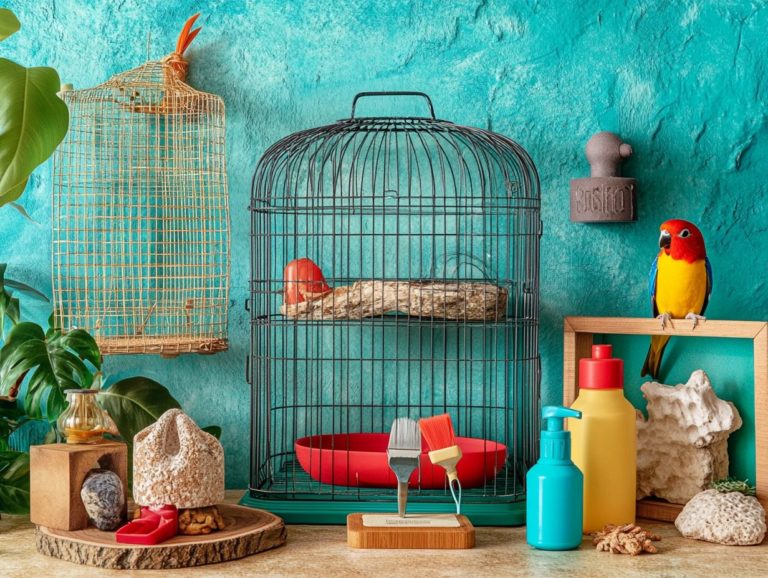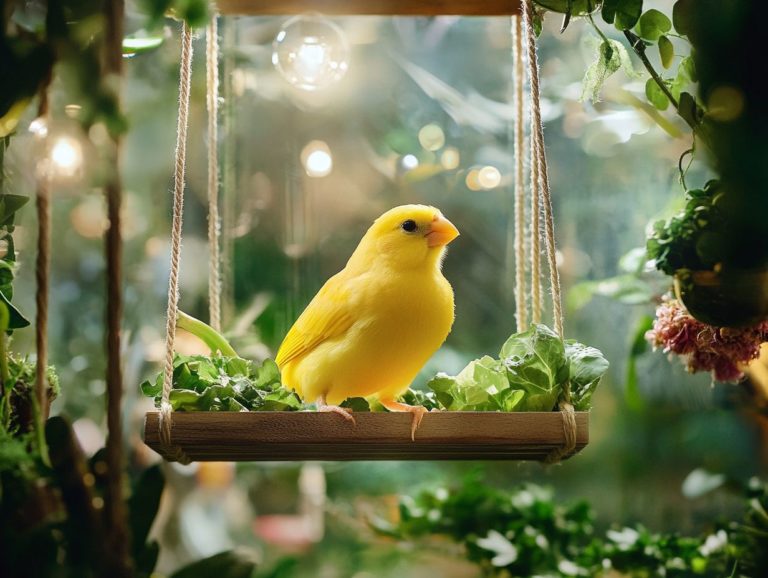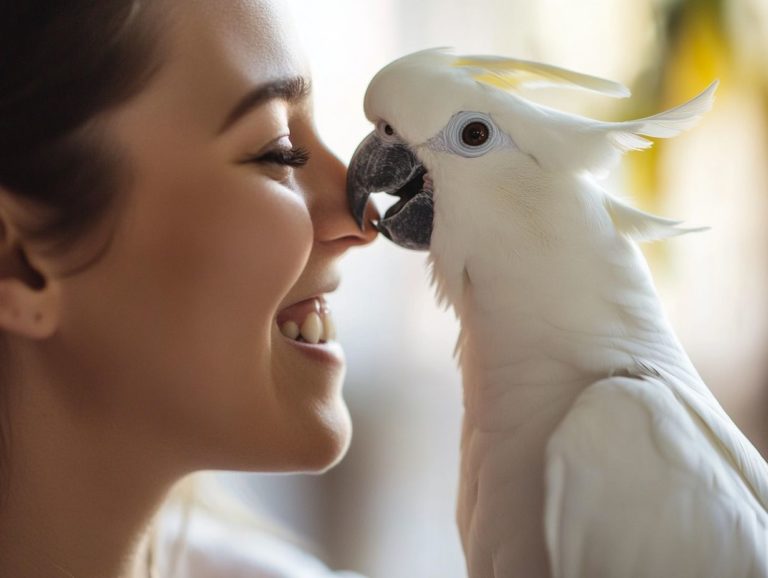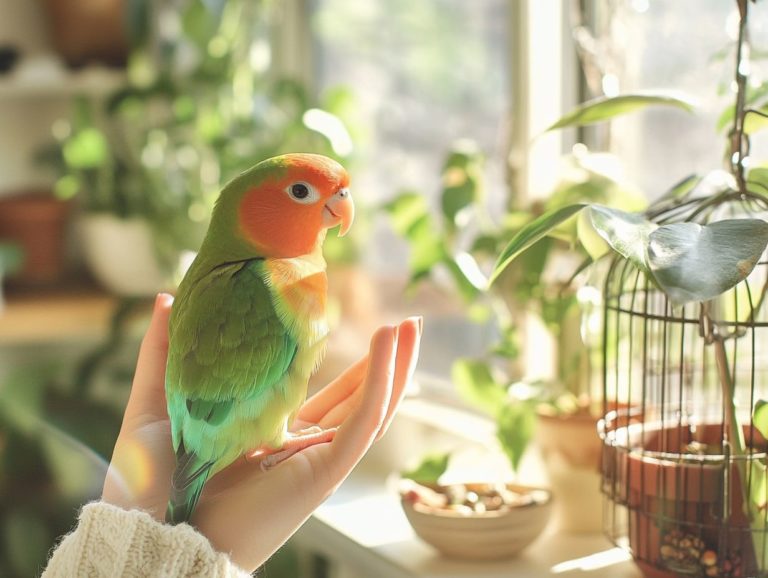Essential Care for Adopted Parrots
Bringing an adopted parrot into your home is a rewarding experience. However, it comes with distinct responsibilities that you must embrace.
These vibrant creatures deserve a thoughtful approach to ensure they thrive in their new environment. From crafting a suitable habitat to understanding their nutritional needs, every detail counts.
This guide will walk you through the essentials of preparing for your feathered companion, establishing a strong bond, and providing long-term care to keep your parrot happy and healthy.
Dive in to uncover the secrets of making your parrot s transition as seamless as possible!
Contents
- Key Takeaways:
- Understanding the Needs of Adopted Parrots
- Preparing for an Adopted Parrot
- Initial Care for an Adopted Parrot
- Long-Term Care for an Adopted Parrot
- Frequently Asked Questions
- What is essential care for adopted parrots?
- Do I need to provide a specific type of cage for my adopted parrot?
- What should I feed my adopted parrot?
- How often should I take my adopted parrot to the vet?
- Can I train my adopted parrot?
- How can I provide mental and physical stimulation for my adopted parrot?
Key Takeaways:
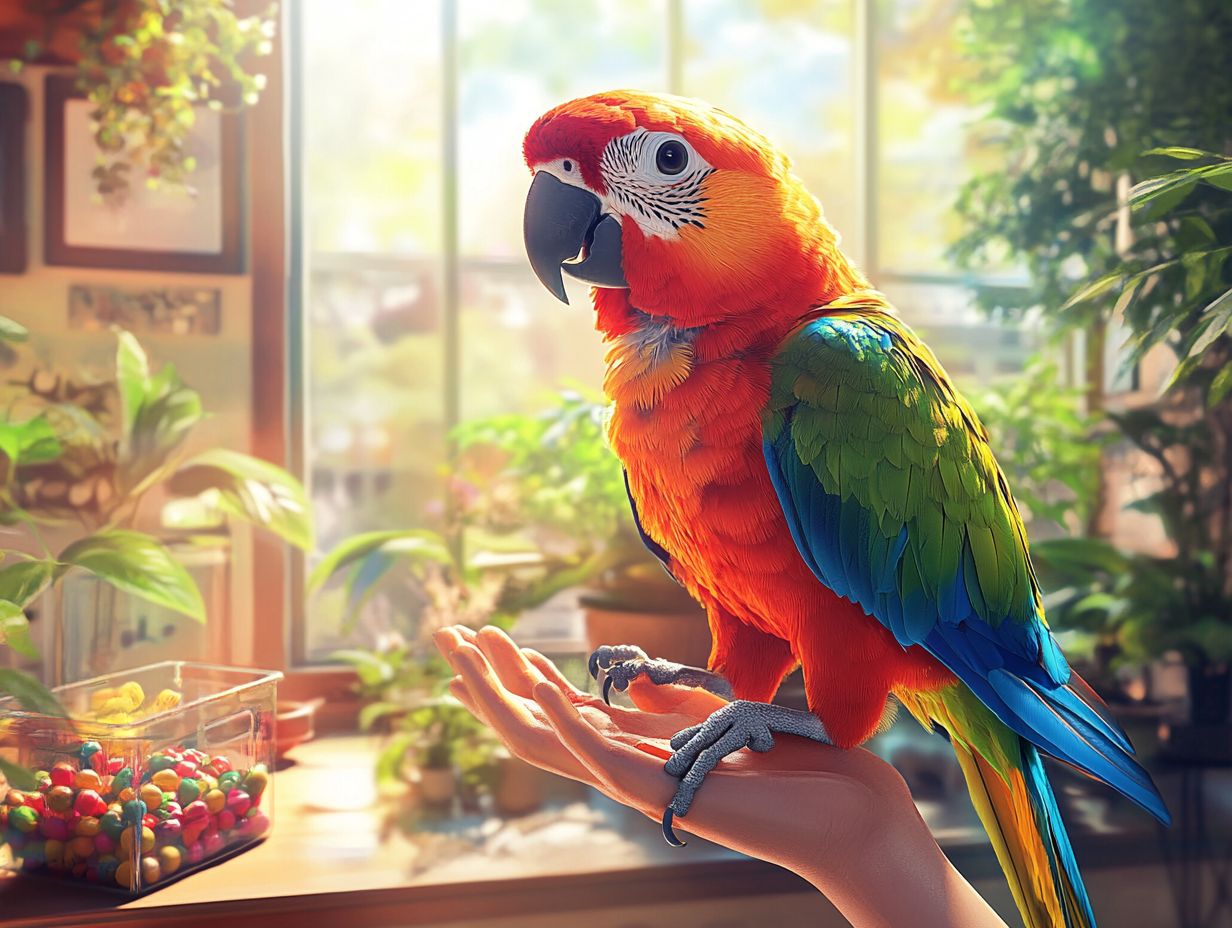
- Provide a suitable environment and necessary supplies for your adopted parrots to feel safe and secure in their new home.
- Establish trust with your adopted parrot through patience and positive reinforcement.
- Nutrition, exercise, and enrichment are essential for your adopted parrot’s long-term health.
Understanding the Needs of Adopted Parrots
Understanding the needs of adopted parrots is crucial for their well-being. These intelligent and social creatures require a dedicated primary adopter who can provide the right care. For more insights, check out how to give your adopted bird a happy home.
This includes knowing their food preferences, living conditions, and how to bond with them during their adjustment period. Such knowledge helps prevent common behavioral issues that may arise from neglect or misunderstanding.
Whether it s honing effective training techniques or maintaining an optimized cage setup, addressing the holistic needs of these vibrant companions fosters trust and creates a secure environment.
Preparing for an Adopted Parrot
Preparing for your adopted parrot requires a thoughtful approach to ensure a seamless transition for your new feathered companion. It’s urgent to create the ideal cage setup that meets their unique environmental needs, and knowing how to handle behavioral issues in adopted birds can also be beneficial.
As the primary adopter, you should consider factors such as humidity levels, dietary requirements, and the inclusion of enrichment toys. Understanding the needs of rescued birds ensures these elements not only stimulate parrot behaviors but also foster trust and bonding.
Recognizing that this initial preparation is foundational to cultivating a healthy and joyful relationship with your new parrot is essential.
Creating a Suitable Environment
Creating the perfect environment for your adopted parrot is exciting and essential! You must carefully consider their specific needs, such as humidity levels and cage setup, along with socialization tips for newly adopted birds.
A well-designed cage, equipped with horizontal bars for climbing and plenty of room for them to stretch their wings, serves as the cornerstone of a flourishing habitat.
Maintaining a clean cage, free from harmful substances, supports their physical well-being and alleviates stress, which can greatly influence your parrot’s behavior and emotional state.
Choosing a diverse array of engaging toys that stimulate their minds and encourage physical activity can ignite their curiosity and develop crucial problem-solving skills.
By rotating these toys regularly, you ensure a consistently stimulating environment, helping to ward off boredom and the destructive behaviors that often stem from a lack of engagement.
Obtaining Necessary Supplies
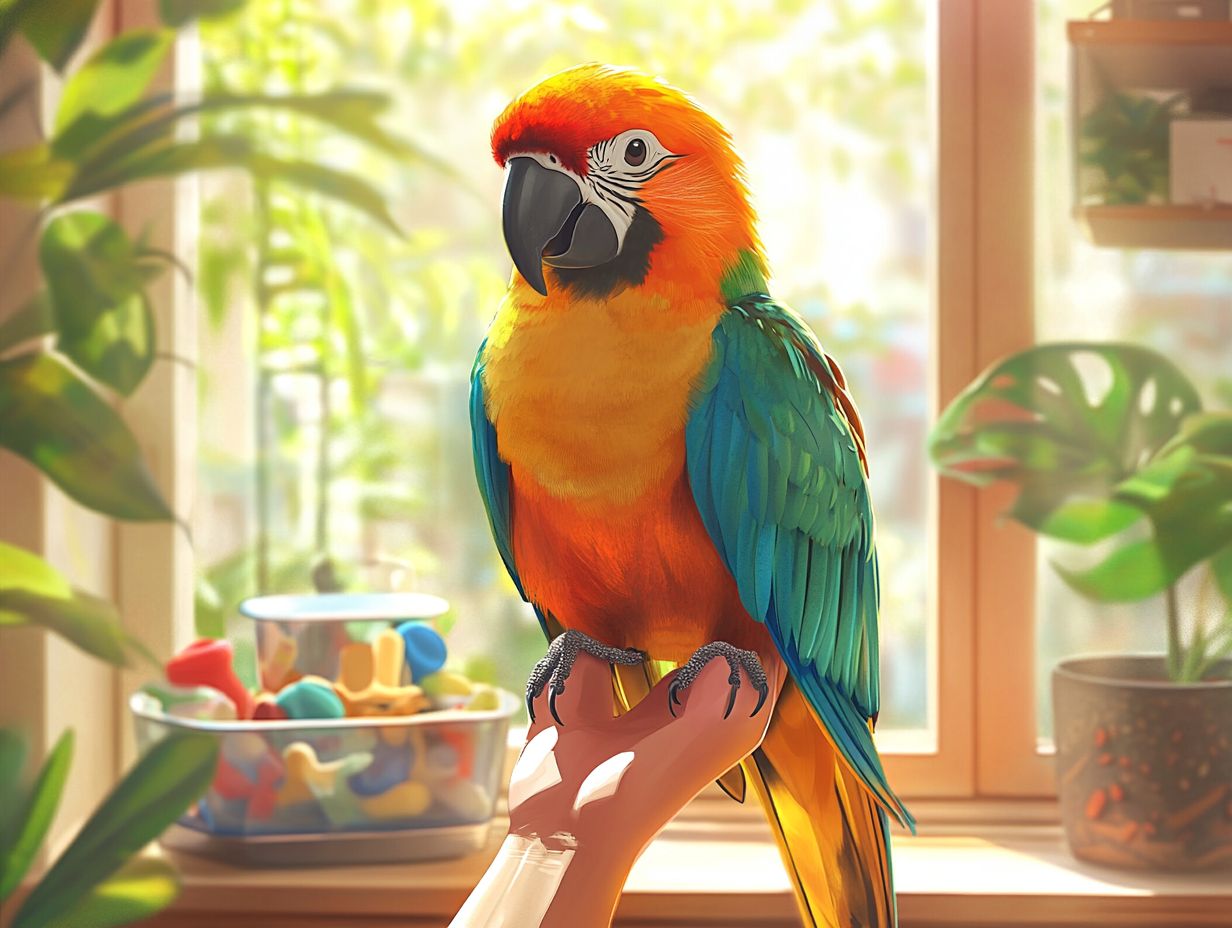
Getting the right supplies for your adopted parrot is an important step for their well-being. To ensure you’re fully prepared, check out what to know before adopting a parrot. The right cage, food, and access to veterinary care all help your feathered friend live a healthy life.
Essential supplies include:
- Spacious, secure cage
- Suitable food and water dishes
- Enrichment toys to stimulate their minds
An ideal cage should offer ample space for flight, complete with perches of varying diameters to support healthy foot development. A balanced mix of pellets, fresh fruits, and vegetables is crucial to meet their nutritional needs. Investing in high-quality, age-appropriate foods can truly make a difference in their health.
Enrichment toys, ranging from foraging puzzles to climbing structures, not only provide entertainment but also encourage natural behaviors. Regular veterinary visits are essential to address any potential health concerns promptly, ensuring your parrot maintains its overall vitality and happiness.
Initial Care for an Adopted Parrot
The initial care for your newly adopted parrot is a key time that shapes the foundation of your relationship. This is the time to focus on the acclimation process and how to bond with your newly adopted bird to build trust.
Understanding your parrot’s behaviors is essential. It’s also important to conduct a thorough health examination to identify any potential issues that could impede their adaptation. By addressing these key aspects, you can significantly reduce the chances of behavioral problems and create a nurturing environment where your parrot can truly thrive, while keeping in mind the potential for nutritional deficiencies that can occur if their dietary needs are not met.
Introducing the Parrot to its New Home
Introducing a new parrot to its home requires meticulous planning and a good dose of patience, as the acclimation process is essential for building trust and ensuring a positive beginning. Create a calm environment to alleviate any stress or anxiety the parrot might feel, paving the way for a smoother transition.
It’s important to understand that potential behavioral issues can arise during this phase, and being prepared for them is key to integrating the parrot successfully into your household. To ease this transition, consider setting up a quiet space where the parrot can feel secure and comfortable, away from loud noises and distractions.
Gradually introducing the parrot to different areas of your home will help them adjust, but remember to do so at a pace that matches their comfort level. Pay attention to their body language signs like puffed feathers or pacing can indicate stress, and addressing these signs promptly will help prevent further issues.
Establishing consistent routines, such as regular feeding and playtime, will foster a sense of security for your new feathered companion. This stability will strengthen your bond and help your new family member thrive in their new environment.
Establishing a Bond with the Parrot
Establishing a bond with your new parrot is a fundamental aspect of parrot care that calls for patience and effective training techniques, essential for addressing potential behavioral issues. You can start building trust through daily interactions, offering treats, and allowing your parrot to explore its new surroundings at its own pace.
To deepen that connection, engage in consistent routines, such as designated playtime or talking sessions. These habits help your parrot feel secure and valued. Positive reinforcement techniques, like rewarding with treats when your parrot exhibits desired behaviors, can significantly enhance trust.
It’s crucial to pay attention to your bird’s body language. Signs of comfort, like relaxed feathers and soft vocalizations, stand in stark contrast to indications of discomfort, such as raised feathers or aggressive postures. This awareness enables you to adjust your approach, fostering a supportive environment that encourages a lasting bond.
Long-Term Care for an Adopted Parrot
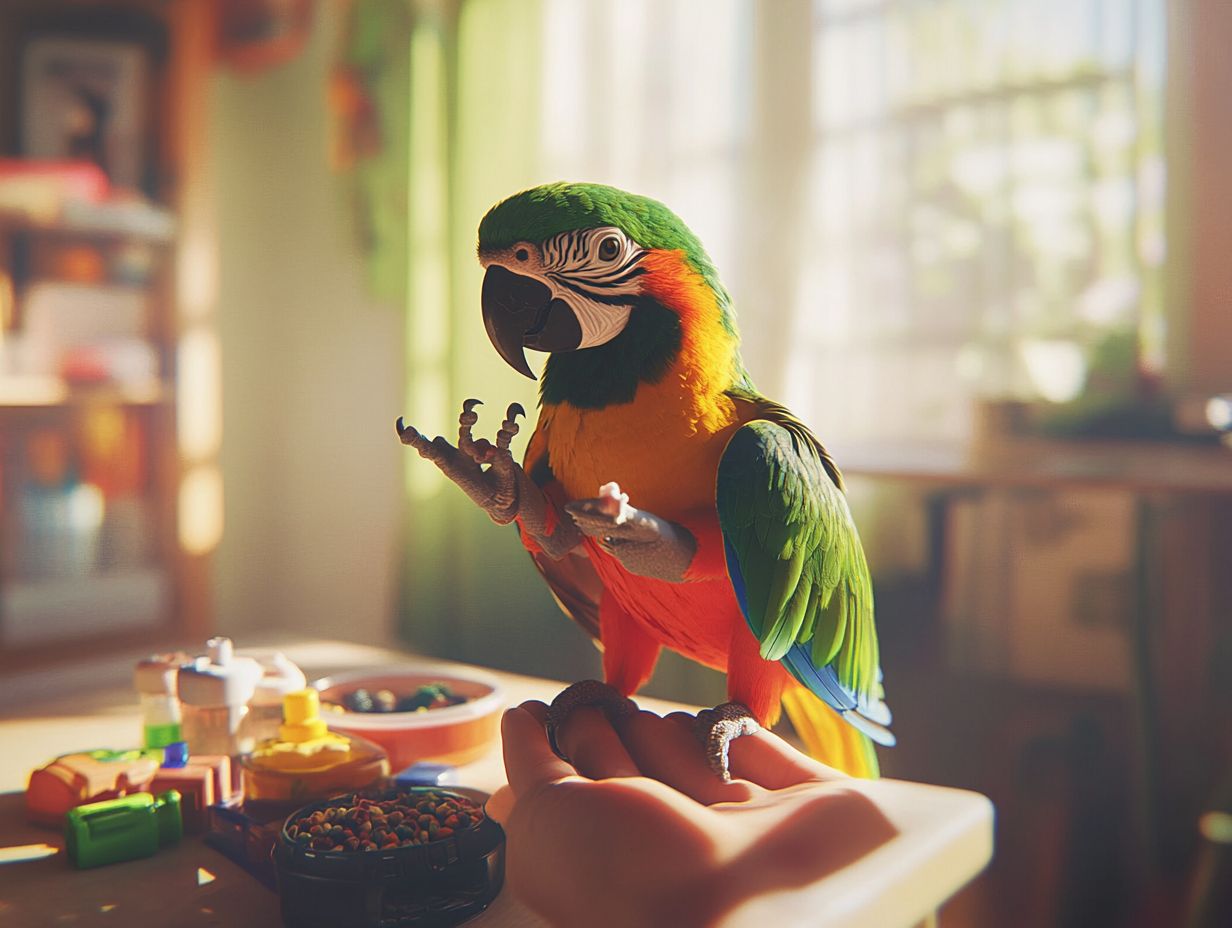
Long-term care for your adopted parrot requires a thoughtful and comprehensive approach that caters to their ongoing dietary needs, behavioral challenges, and how to create a safe space for your adopted bird with effective training techniques.
This ensures that your feathered companion enjoys a fulfilling life.
A consistent routine with regular health check-ups is vital. A stimulating environment filled with enriching toys also helps.
Focus on these elements to create a happy and healthy home for your parrot, enhancing both their well-being and your shared experience, while also being aware of common breeds like African Greys, Amazon Parrots, and Macaws.
Feeding and Nutrition
Feeding and nutrition are at the heart of parrot care. Meeting your parrot s dietary needs is essential for preventing missing important nutrients and ensuring overall health and wellness. Consulting with an avian vet during health check-ups can offer you personalized dietary recommendations tailored to your parrot s specific species and unique needs.
Providing a balanced diet with a variety of foods is the key to keeping your parrot both healthy and happy.
Different parrot species have distinct nutrient requirements, often reflecting their natural dietary habits. For example, larger species tend to thrive on higher seed varieties, while smaller parrots flourish with fruits and vegetables packed with vitamins.
Keep an eye out for subtle signs of missing nutrients, such as feather plucking or shifts in behavior; these can be indicators that something s amiss. Regular check-ups are vital, as an avian veterinarian can evaluate dietary habits and recommend necessary adjustments.
Here are some practical feeding tips:
- Incorporate a mix of pellets
- Offer fresh produce
- Treat occasionally with nuts
Make sure to avoid dangerous foods like avocado, chocolate, and sugary treats they can harm your parrot!
Exercise and Enrichment
Exercise and enrichment are absolutely essential for keeping your parrot healthy and engaged. By providing a variety of enrichment toys and activities, you can effectively prevent the common behavioral problems that often arise from boredom.
Implementing effective training techniques that promote both physical activity and mental stimulation is key to nurturing positive behaviors in your feathered friend. Regular playtime outside the cage, along with interactive toys, can truly elevate your parrot’s quality of life.
There s a plethora of enrichment toys to explore think foraging puzzles that challenge your parrot’s problem-solving skills or chewable toys that cater to their natural instincts. Engaging with these toys not only encourages movement but also sharpens cognitive abilities, transforming playtime into a delightful and beneficial experience.
To create a stimulating environment, consider rotating toys regularly and adding climbing structures or swings that invite exploration and interaction. Incorporating training sessions into your daily routine strengthens the bond between you and your parrot while also teaching them new tricks, further enhancing their mental and physical well-being.
By cultivating a playful and interactive atmosphere, you can significantly diminish the likelihood of behavioral issues, ensuring your parrot remains a happy and thriving companion.
Common Health Concerns and How to Address Them
Common health concerns in parrots can significantly impact their quality of life. Regular veterinary care and health examinations are absolutely essential for identifying and addressing issues like a lack of proper nutrition and diseases such as Psittacine Beak & Feather Disease, a serious illness affecting parrots’ feathers and beaks.
By being proactive in monitoring your parrot’s health, you can prevent behavioral problems stemming from discomfort or illness, ensuring your feathered friend remains happy and healthy.
Being attentive to specific signs of distress like changes in appetite, feather plucking, and unusual droppings can help you catch potential issues early. Routine check-ups allow for the early detection and management of common ailments such as respiratory infections and obesity, both of which can have serious consequences if left untreated.
Don’t forget about vaccinations and parasite control, as these are critical aspects of preventive care that should be part of your routine. By building a solid relationship with an avian veterinarian, you can ensure your companion receives tailored advice and treatment options that specifically cater to their unique needs.
Frequently Asked Questions
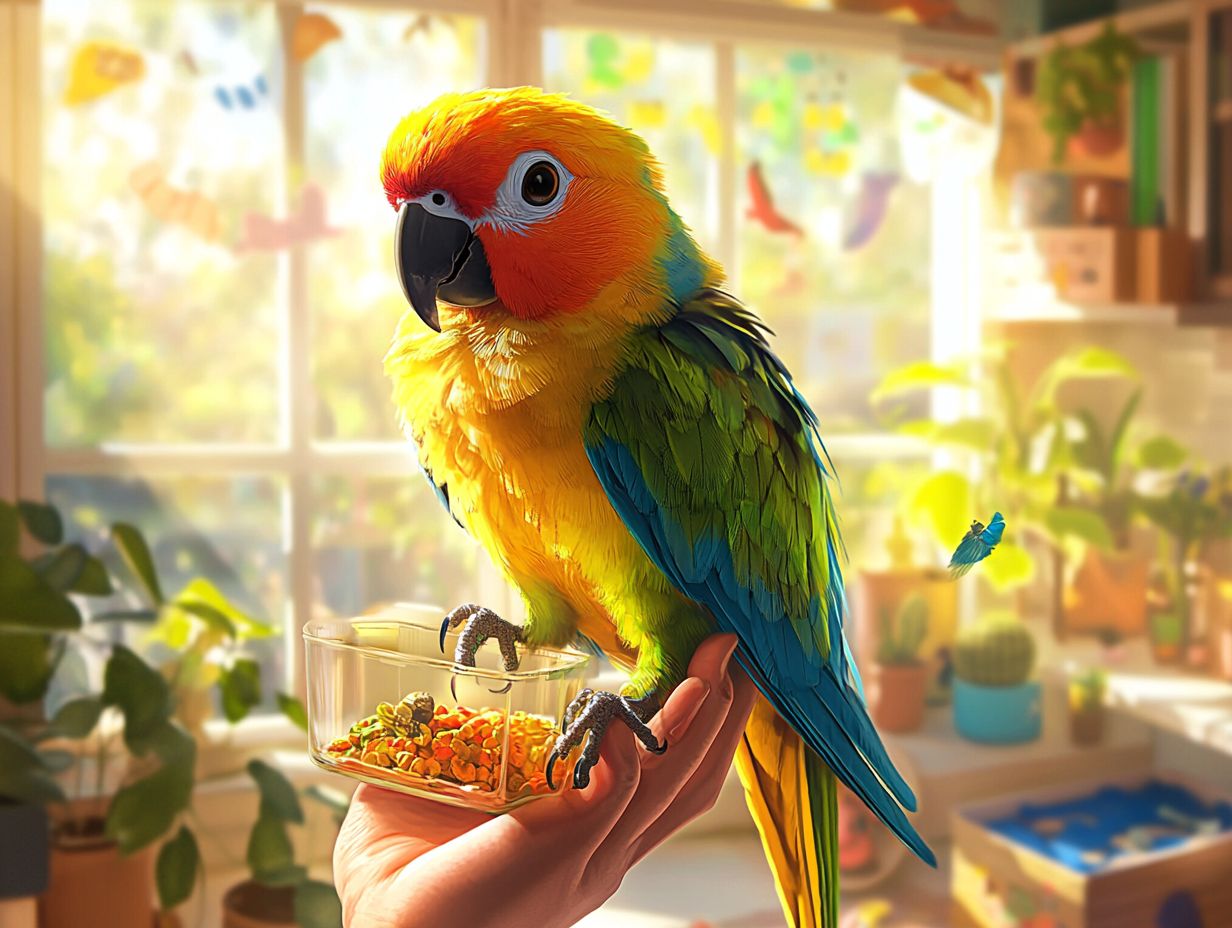
What is essential care for adopted parrots?
Essential care for adopted parrots includes providing a suitable and spacious cage, a balanced and nutritious diet, regular vet check-ups, and plenty of mental and physical stimulation. For aging cockatoos, it’s important to understand essential care practices to ensure their well-being.
Do I need to provide a specific type of cage for my adopted parrot?
Yes, parrots require a cage that is large enough for them to spread their wings and move around freely. It should also have perches, toys, and enough space for food and water dishes.
What should I feed my adopted parrot?
A balanced diet for adopted parrots should include a variety of fresh fruits, vegetables, nuts, and seeds. Make sure to explore your parrot’s specific dietary needs.
How often should I take my adopted parrot to the vet?
Schedule a vet check-up at least once a year! However, if you notice any changes in behavior or health, contact your vet right away.
Can I train my adopted parrot?
Yes, parrots are highly intelligent and can be trained with positive reinforcement. It is important to start training early and be consistent and patient with your parrot.
How can I provide mental and physical stimulation for my adopted parrot?
You can provide mental stimulation for your parrot with toys, puzzles, and games. Physical stimulation can be achieved through supervised out-of-cage time, flight exercises, and foraging activities.
If you have further questions, consult a vet or an avian expert for more personalized information.

